C# developers are the backbone of many software applications, providing the necessary logic and functionality to bring ideas to life. They work on a variety of projects, from desktop applications to web services, ensuring robust and efficient performance.
C# development skills include proficiency in the C# programming language, understanding of the .NET framework, and familiarity with object-oriented programming principles. Additionally, skills like debugging, problem-solving, and effective communication are crucial for success in this role.
Candidates can write these abilities in their resumes, but you can’t verify them without on-the-job C# Developer skill tests.
In this post, we will explore 8 essential C# Developer skills, 10 secondary skills and how to assess them so you can make informed hiring decisions.
Table of contents
8 fundamental C# Developer skills and traits
The best skills for C# Developers include C Sharp Proficiency, .NET Framework, ASP.NET MVC, Entity Framework, LINQ, API Development, Unit Testing and Version Control.
Let’s dive into the details by examining the 8 essential skills of a C# Developer.
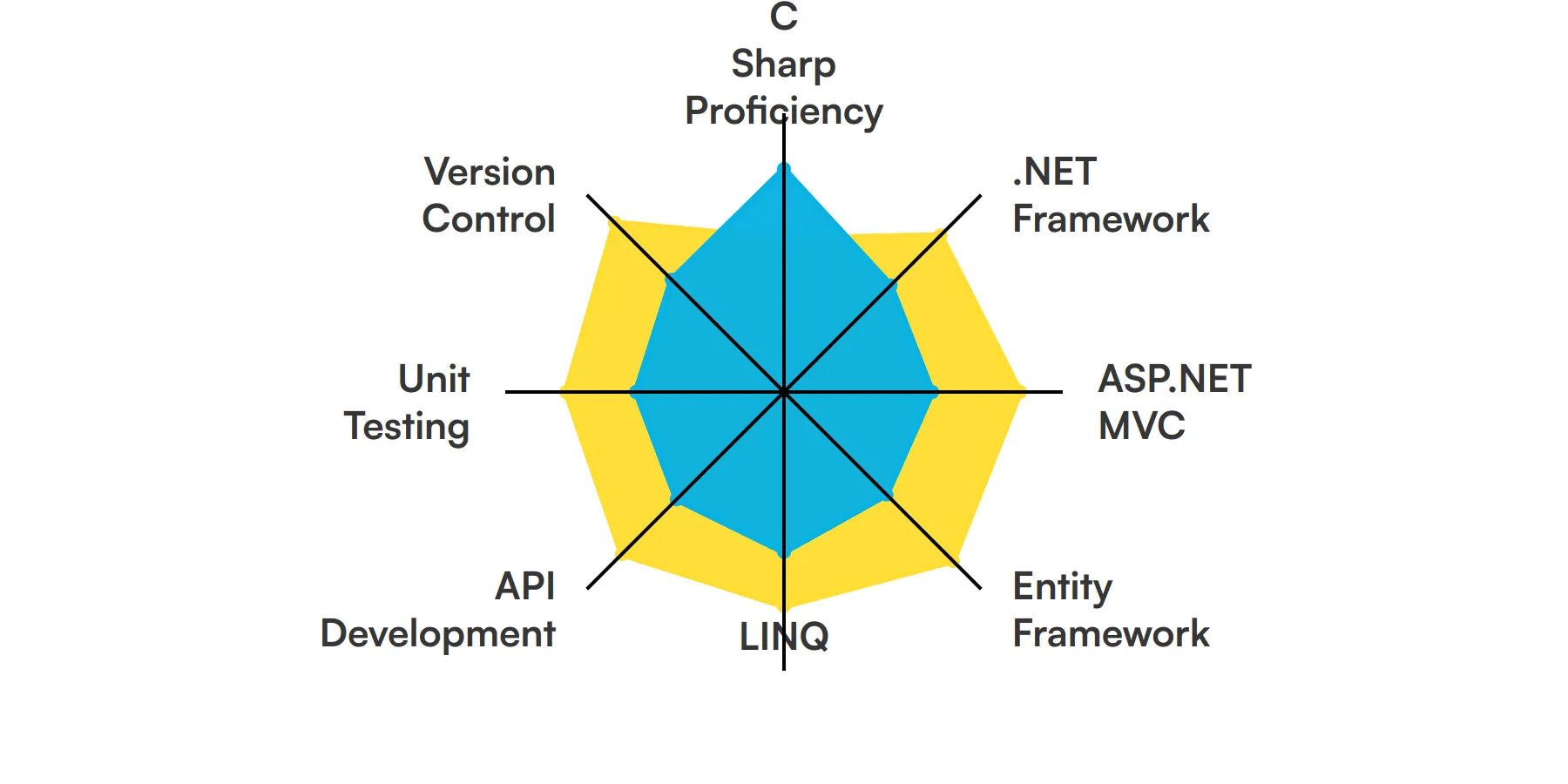
C Sharp Proficiency
A C# developer must have a deep understanding of C# language fundamentals and syntax. This skill is used to write clean, maintainable code for various applications, from desktop to web-based systems. Mastery of C# enables the developer to effectively tackle software development projects and implement functional requirements.
For more insights, check out our guide to writing a C# Developer Job Description.
.NET Framework
Knowledge of the .NET framework is crucial for a C# developer as it provides the necessary environment for building and running applications. This includes familiarity with .NET Core for cross-platform development. Understanding .NET helps in utilizing its extensive libraries and tools to create efficient and secure applications.
ASP.NET MVC
ASP.NET MVC is a framework for building scalable, standards-based web applications using well-established design patterns and the power of AS.NET and the .NET Framework. The role of a C# developer involves using this skill to design dynamic and robust websites with a clear separation of concerns, including data, UI, and logic.
Entity Framework
Entity Framework is an object-relational mapper that enables .NET developers to work with a database using .NET objects, eliminating the need for most of the data-access code. C# developers use this to simplify data manipulation, ensuring the application interacts seamlessly with its data storage.
Check out our guide for a comprehensive list of interview questions.
LINQ
Language Integrated Query (LINQ) allows C# developers to write queries for retrieving data from sources like databases, arrays, and XML documents directly within C#. This skill is essential for creating efficient data handling and manipulation features within applications.
API Development
Developing APIs is a key skill for C# developers, enabling the creation of scalable and flexible software systems. APIs facilitate interaction between different software programs, making it essential for developers to master API development to enhance application interoperability and functionality.
Unit Testing
Unit testing involves testing individual components of the software application to ensure they function correctly. A C# developer uses this skill to validate each part of the code and ensure that logical errors are caught early in the development cycle, leading to more stable and reliable software.
Version Control
Familiarity with version control, especially tools like Git, is essential for C# developers to manage changes to the project codebase. This skill helps in tracking modifications, collaborating with other developers, and maintaining the integrity of the project over time.
10 secondary C# Developer skills and traits
The best skills for C# Developers include SQL, WPF, Azure, Xamarin, Blazor, SignalR, Design Patterns, Agile Methodologies, Docker and Microservices.
Let’s dive into the details by examining the 10 secondary skills of a C# Developer.
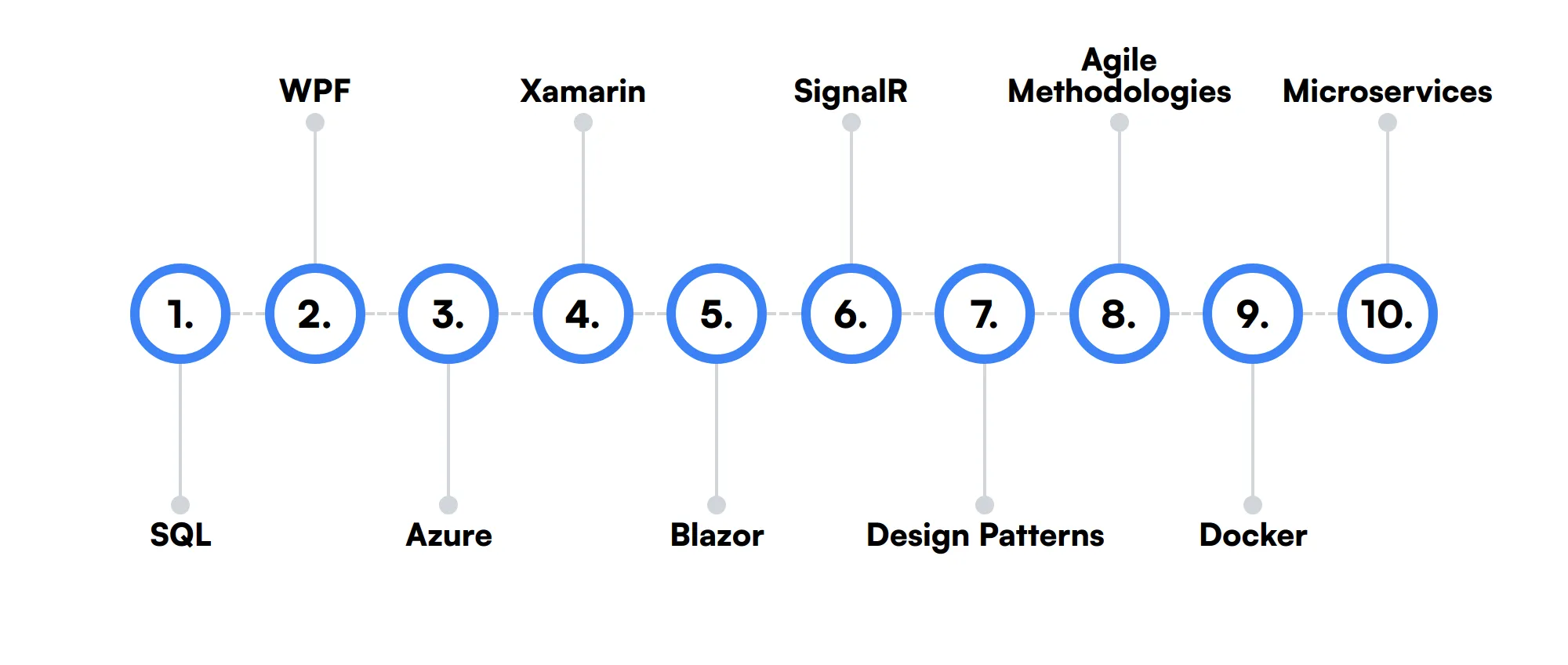
SQL
SQL proficiency allows a C# developer to manage and manipulate databases effectively. This skill is important for roles involving data-heavy applications where complex queries and data management are frequent.
WPF
Windows Presentation Foundation (WPF) is used for creating graphical user interfaces in the Windows-based applications. C# developers use WPF to design rich, interactive UIs that enhance user experience.
Azure
Knowledge of cloud services, particularly Microsoft Azure, is beneficial for C# developers as more companies move to cloud infrastructure. Azure skills enable developers to deploy, manage, and scale applications more efficiently.
Xamarin
Xamarin is a tool used by C# developers for creating mobile applications that can run on multiple platforms using a single code base. This skill is valuable for projects that require cross-platform functionality with native performance.
Blazor
Blazor allows C# developers to build interactive web UIs using C# instead of JavaScript. This skill is increasingly popular for projects that aim to utilize C# across the entire stack, improving development synergy.
SignalR
SignalR is a library for adding real-time web functionality to applications. C# developers use SignalR to enable real-time communication features like chat systems or live content updates in web applications.
Design Patterns
Understanding common software design patterns is beneficial for C# developers to solve recurring design problems and write code that is both reusable and understandable. This skill helps in structuring code effectively for larger applications.
Agile Methodologies
Experience with Agile methodologies is useful for C# developers to adapt to changing requirements and improve collaboration with team members. Agile practices support a more dynamic and responsive development process.
Docker
Familiarity with containerization, especially using Docker, can be advantageous for C# developers in environments where consistency across multiple development and production settings is crucial.
Microservices
Understanding the architecture and development of microservices allows C# developers to build applications that are scalable, flexible, and suitable for complex enterprise environments.
How to assess C# Developer skills and traits
Assessing the skills and traits of a C# developer involves more than just glancing at their resume. It's about understanding how well they can apply their knowledge of C#, .NET Framework, ASP.NET MVC, and other key technologies in real-world scenarios. Finding the right developer means looking beyond their technical skills to see if they can solve problems, adapt to new challenges, and work well within your team.
Traditional interviews often don't reveal the full picture of a candidate's abilities. This is where practical assessments come into play. By using tools like Adaface assessments, you can simulate real-life tasks for candidates to solve, providing a clear picture of their technical competencies and problem-solving skills. Adaface tests are designed to mirror the complexities of actual development work, ensuring that you assess not just knowledge, but also how effectively a candidate can use that knowledge. Learn more about Adaface assessments here.
With Adaface, you can create a customized test that includes challenges related to C# proficiency, API development, unit testing, and version control, among others. This approach not only helps in identifying the most skilled developers but also significantly cuts down on screening time, with some companies experiencing up to an 85% reduction.
Let’s look at how to assess C# Developer skills with these 6 talent assessments.
C# Online Test
Our C# Online Test evaluates a candidate's proficiency in C# programming, covering a wide range of topics from basics to advanced concepts.
The test assesses their understanding of C# basics, OOP concepts, inheritance and polymorphism, error handling, garbage collection, design patterns, multithreading, and networking. It includes scenario-based MCQs and a coding question to gauge hands-on programming skills.
Successful candidates demonstrate a strong grasp of C# fundamentals, object-oriented programming, and the ability to write scalable and maintainable code.
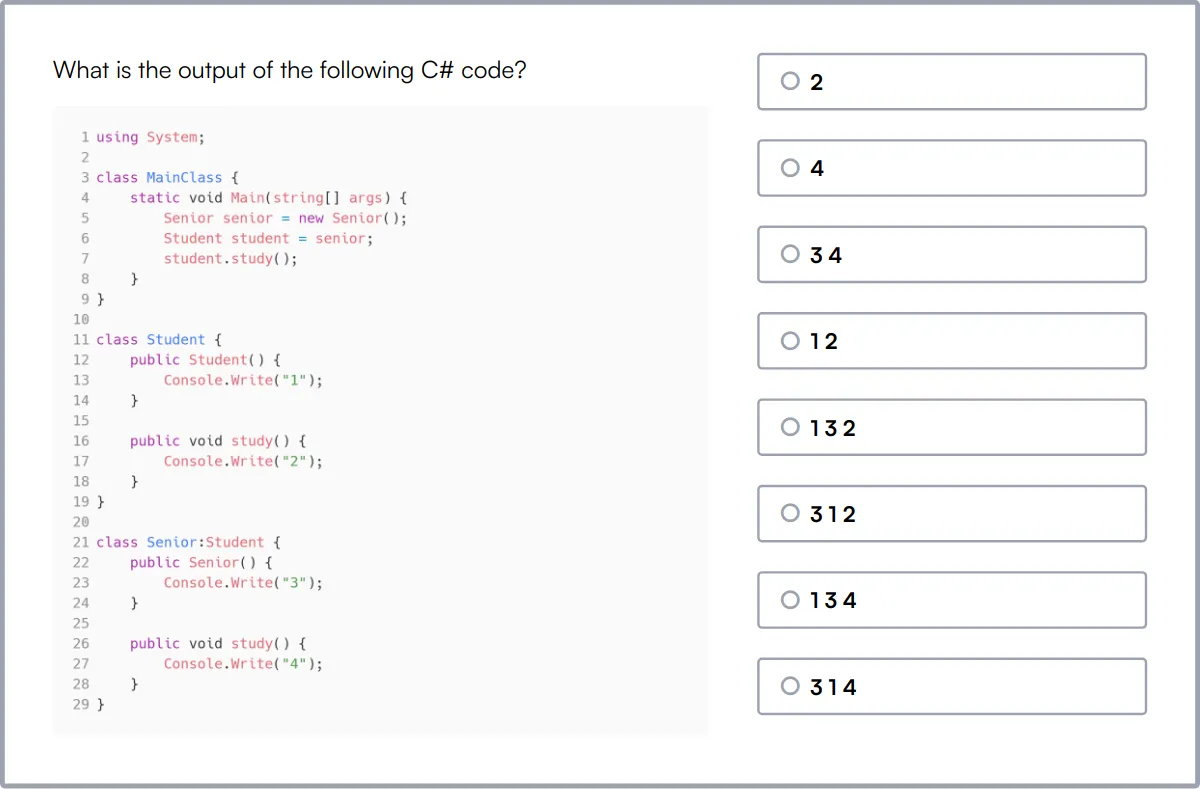
.NET Online Test
Our .NET Online Test assesses a candidate's proficiency in working with Microsoft .NET technologies, including the .NET framework, C#, and ASP.NET.
The test evaluates their ability to write .NET code, manage .NET projects, use .NET libraries and frameworks, and develop web applications using ASP.NET. It includes scenario-based MCQs and a coding question.
Candidates who perform well show a solid understanding of the .NET ecosystem, web API development, and MVC architecture.
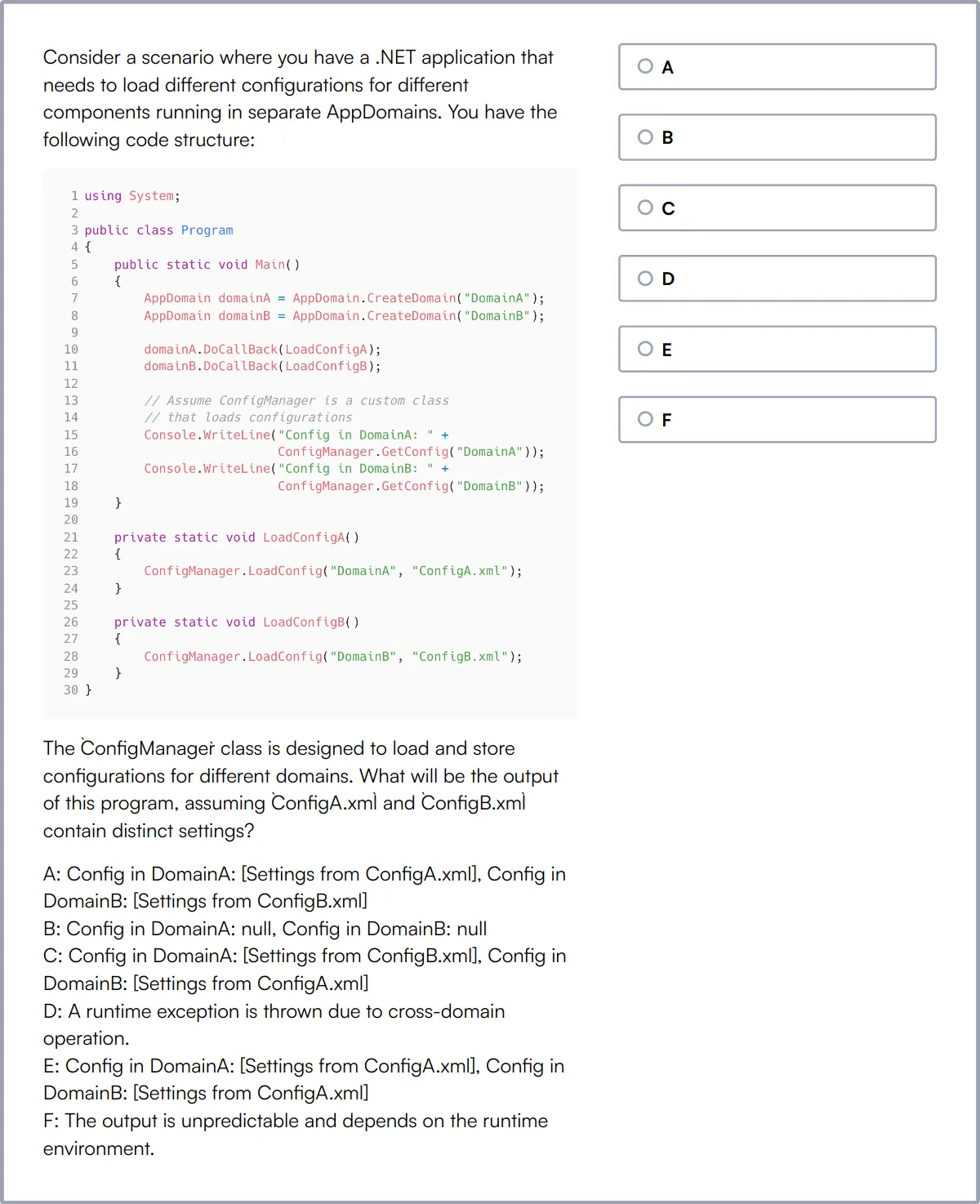
Asp.Net MVC Online Test
Our Asp.Net MVC Online Test evaluates a candidate's proficiency in the Microsoft .NET framework and the Asp.Net MVC architecture.
The test covers C# programming, OOP, web development, Asp.Net MVC fundamentals, routing, Razor view engine, entity framework, and debugging. It includes scenario-based MCQs and a coding question.
High-scoring candidates demonstrate the ability to design and develop web applications using the Asp.Net MVC framework and write maintainable code.
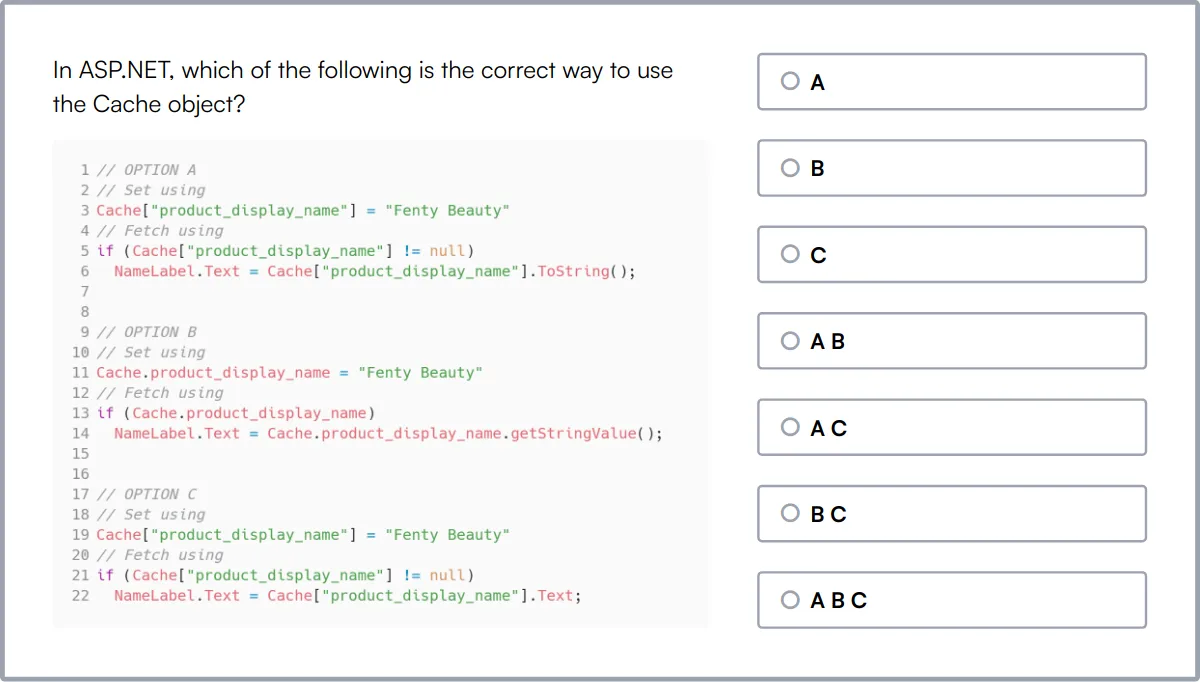
Entity Framework Online Test
Our Entity Framework Online Test evaluates a candidate's knowledge of Entity Framework, including database schema, data modeling, and query optimization.
The test assesses their proficiency in Entity Framework, LINQ, database connectivity, query optimization, and data access layer. It includes scenario-based MCQs and a coding question.
Candidates who excel in this test show a strong understanding of working with Entity Framework and designing data-driven applications.
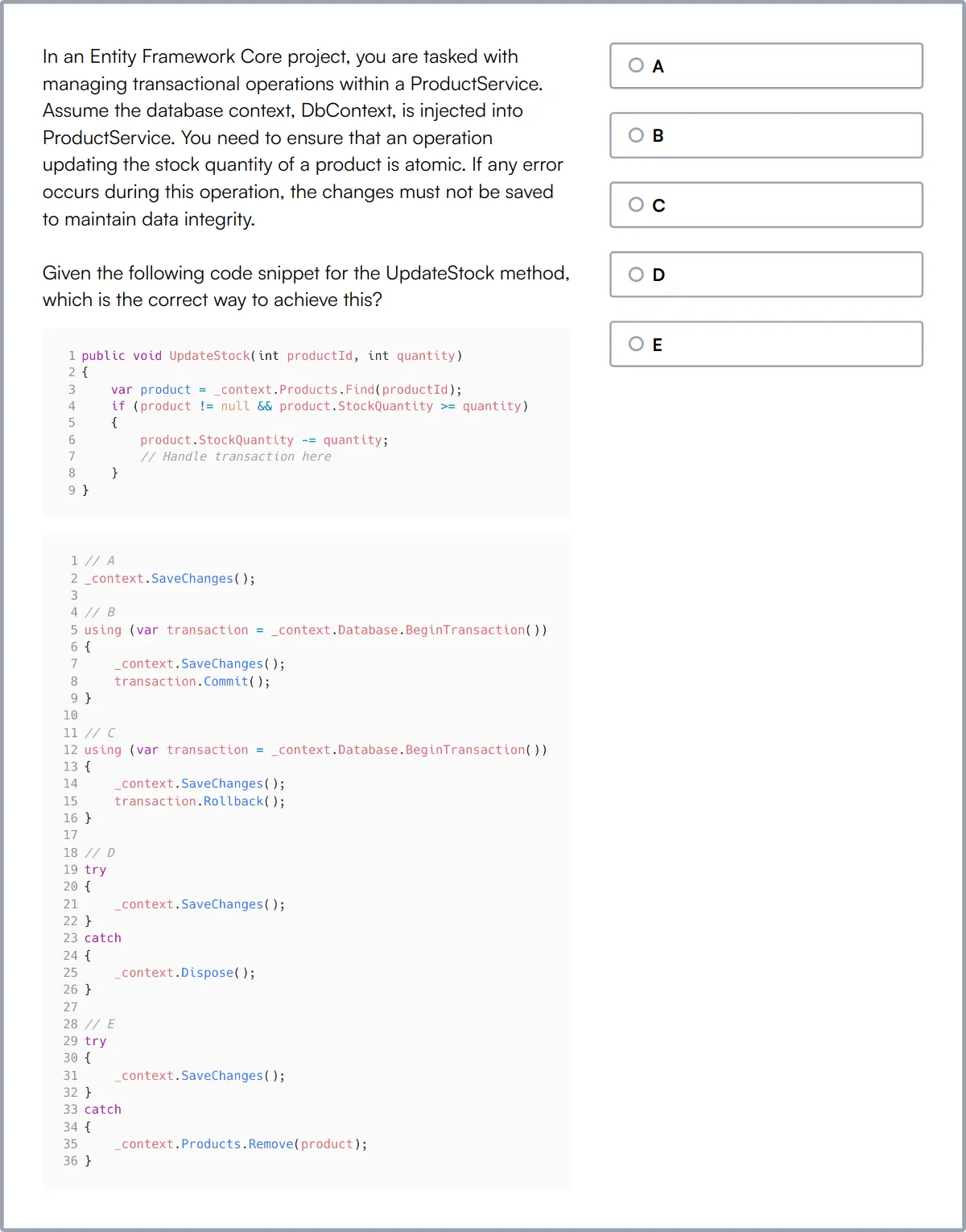
LINQ Online Test
Our LINQ Online Test evaluates a candidate's proficiency in LINQ, a powerful query language for manipulating data in C# and other .NET languages.
The test covers query expressions, lambda expressions, standard query operators, deferred execution, join operations, aggregation, grouping, sorting, filtering, and data transformation. It includes scenario-based MCQs.
Successful candidates demonstrate the ability to write efficient LINQ queries and understand LINQ operators and expressions.
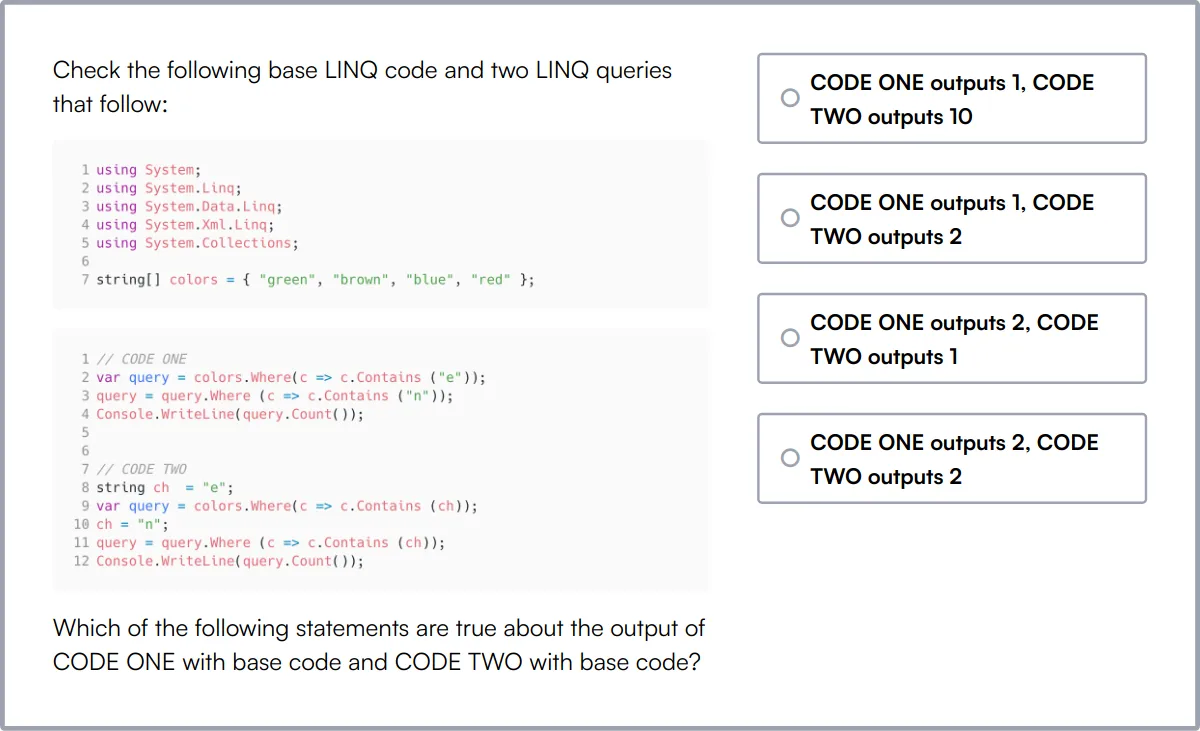
REST API Test
Our REST API Test evaluates a candidate's understanding of RESTful APIs and their ability to create, interact, and test them.
The test assesses knowledge of REST principles, HTTP methods, status codes, authentication, serialization formats, and best practices. It includes multiple-choice questions and a coding question.
Candidates who perform well show a strong grasp of designing and implementing RESTful APIs and adhering to best practices.
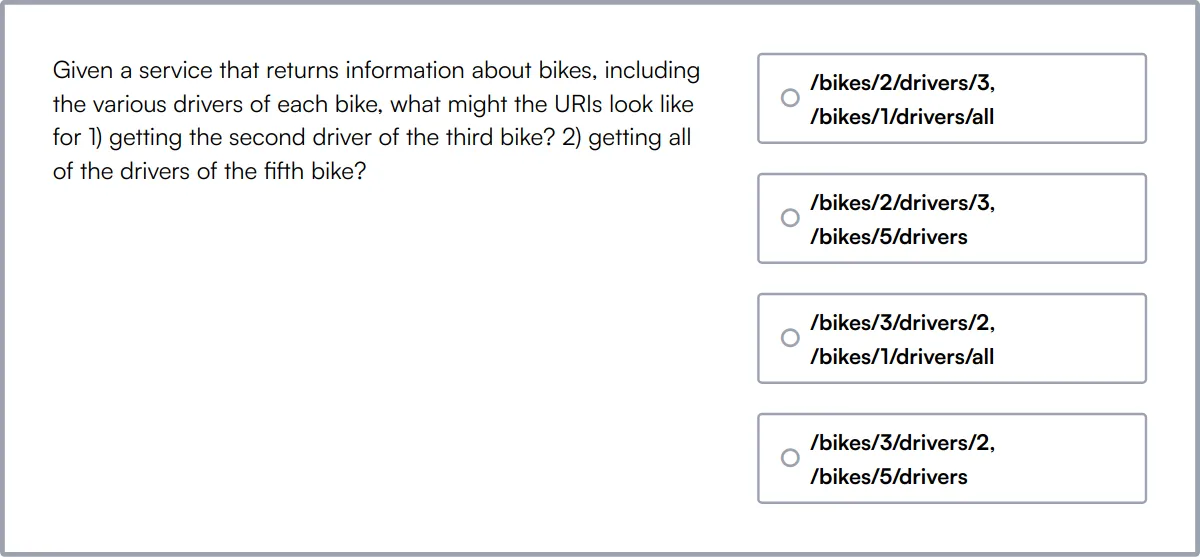
Summary: The 8 key C# Developer skills and how to test for them
| C# Developer skill | How to assess them |
|---|---|
| 1. C Sharp Proficiency | |
| 2. .NET Framework | Assess familiarity and skill in building applications using .NET Framework. |
| 3. ASP.NET MVC | Check understanding and application of the ASP.NET MVC architecture. |
| 4. Entity Framework | Review proficiency in using Entity Framework for data manipulation. |
| 5. LINQ | Test ability to use LINQ for querying and transforming data. |
| 6. API Development | Examine skills in designing and implementing RESTful services. |
| 7. Unit Testing | Determine capability to write and maintain unit tests. |
| 8. Version Control | Evaluate use of version control systems like Git for code management. |
C# Online Test
C# Developer skills FAQs
What are the key skills required for a C# Developer?
A C# Developer should be proficient in C#, .NET Framework, and ASP.NET MVC. Skills in Entity Framework, LINQ, API development, and SQL are also important. Familiarity with WPF, Azure, Xamarin, Blazor, and SignalR enhances a developer's capability.
How can a recruiter assess a candidate's proficiency in C#?
Recruiters can assess C# proficiency through technical interviews, coding tests, and reviewing past projects. Asking candidates to solve real-world problems using C# can also provide insight into their practical skills.
What is the importance of ASP.NET MVC for a C# Developer?
ASP.NET MVC is important for C# developers as it allows for building scalable, dynamic websites and applications. It separates an application into three main components—Model, View, and Controller—making it easier to manage and scale.
Why is knowledge of Entity Framework beneficial for C# developers?
Entity Framework simplifies data manipulation in applications by allowing developers to work with data using objects, eliminating the need for most data-access code. This makes data operations more manageable and less error-prone.
What role does API development play in a C# developer's job?
API development is crucial as it enables applications to interact with other software. C# developers use APIs to extend the functionality of their applications and to integrate with external services and systems.
How does understanding Design Patterns benefit a C# developer?
Understanding design patterns helps C# developers solve common software design issues more effectively. Patterns provide tested solutions to recurring problems, improving code readability and scalability.
What is the significance of Agile Methodologies in C# development?
Agile methodologies promote adaptive planning, evolutionary development, and continual improvement, facilitating flexible responses to change. This is particularly useful in C# development projects to meet dynamic client demands.
How can Docker and Microservices enhance a C# developer's project?
Docker facilitates the deployment of applications inside lightweight containers, ensuring consistency across environments. Microservices architecture allows C# applications to be broken down into smaller, independent services, improving modularity and scalability.

40 min skill tests.
No trick questions.
Accurate shortlisting.
We make it easy for you to find the best candidates in your pipeline with a 40 min skills test.
Try for freeRelated posts



